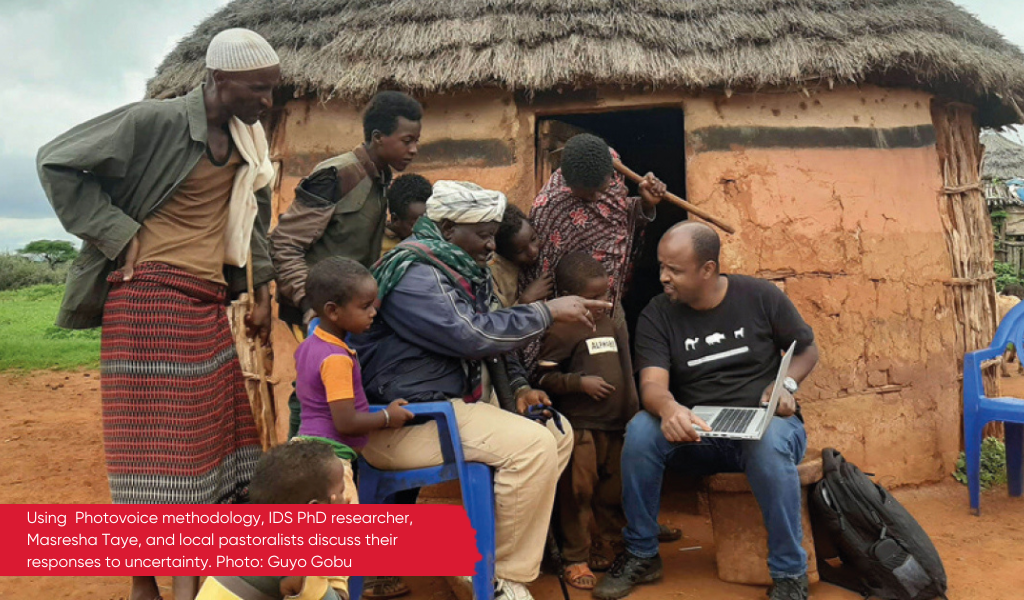Participatory research and inquiry is all about ‘putting the people who are experiencing the problems at the heart of finding the solutions’. As interest in participatory methods has surged, IDS this year produced a highly acclaimed and comprehensive handbook aimed at social science researchers across many disciplines.
The two-volume Sage Handbook of Participatory Research and Inquiry is edited by two IDS research fellows – Danny Burns (whose words define participatory research just above) and Jo Howard – with Sonia M. Ospina of New York University. It has been praised as a resource that ‘researchers with varied expertise in the field can use to support the type of social transformation that we need,’ according to UN Deputy General Secretary Amina Mohammed, who added: ‘I encourage all researchers to make full use of it.’
An international group of 150 authors wrote the 71 chapters that cover the explosion of new participatory research methods over the past two decades, the foundations of participatory research, and critical practice issues, including ethics and inclusion. Several research fellows at IDS also served as section editors and contributors.
The handbook applies to the work of a diverse spectrum of social science researchers – from health and social care, development studies, sociology, criminology, education and business, and civil society groups.
High praise and interest levels
To launch the handbook, IDS hosted a Participation Research Week in September with events facilitated by IDS contributors that attracted more than 700 people. These included a series of webinars where the handbook editors and authors shared cutting-edge approaches, practices and ideas with an audience of policymakers, practitioners, students, NGOs and development experts from around the world.
The handbook has attracted highly positive reviews. A ‘landmark achievement’ and a ‘state-of-the-art contribution’ to participatory research, was the assessment of Yoland Wadsworth, former President of the Action Learning Action Research Association (ALARA).
‘This rich, inspiring collection is testament to the extraordinary creativity of those who have brought about a veritable revolution in research through participatory methodologies and approaches,’ affirmed Professor Andrea Cornwall, Pro-Director (Research and Enterprise), SOAS University of London.
Garnering knowledge in uncertain times
Understanding rural settings and indigenous ways of knowing can be captured through participatory Photovoice approaches – visual research methods that enable participants to document and share their lived realities. These have been used by the European Research Council-funded PASTRES (Pastoralism, Uncertainty and Resilience) research programme. Working in six countries across three continents, PASTRES is learning how pastoralists – mobile livestock keepers making use of extensive rangelands – respond to uncertain environmental, market and political conditions. Using Photovoice, PASTRES PhD researchers supported pastoralists to record their own perspectives on living with uncertainty, in photo and video. Participants created an accompanying narrative to present in discussions with other community members to generate reflection and to use as a basis for future action.

An online exhibition Seeing Pastoralism ensures that the Photovoice project is gaining a global audience. Images and their accompanying stories were displayed during the COP26 climate conference in Glasgow, as well as in Brighton, Florence, Isiolo and Sardinia. Further physical exhibitions are planned in Addis Ababa, Beijing, Brussels, Rome and Stockholm.
Together with pastoral leaders from across the world, a major new report – Are livestock always bad for the planet? – was launched at COP26. The report argues that important decisions about climate mitigation, food systems and land use are being based on partial or misleading evidence.
Mobile, extensive pastoralism can offer a sustainable alternative to industrial systems, addressing climate change and enhancing biodiversity, while providing nutritious diets and livelihoods in marginal areas. Through the eyes of pastoralists, the Seeing Pastoralism exhibition shows the opportunities of sustainable livestock systems.